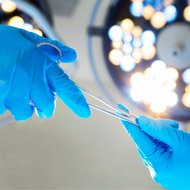Scientists launch world’s first antimicrobial medical gloves

Researchers expect the gloves to eventually sell in their billions, as healthcare providers battle to fight infection and combat antimicrobial resistance.
The world’s first non-leaching antimicrobial gloves were launched yesterday (31 May) in London.
The gloves contain a new active microorganism-killing molecule designed to prevent the spread of bacteria. Because the technology is built into the material, the gloves don’t need surface applications of further solutions or testing.
In independent testing, the gloves achieved a 99.9 per cent kill within just five minutes of contact. University of Nottingham microbiologist Richard James, who helped with the project, said the gloves will be a “game-changer” for the healthcare industry.
“I am delighted that my lifetime’s research into bacteria and antibiotic resistance has directly informed the science behind a practical tool that will have a major impact on medical care in the future,” he said.
The gloves are the culmination of more than six years of research by Professor James, medical glove makers Hartalega Malaysia and development company Chemical Intelligence UK. They are expected to sell in their billions, as healthcare providers battle to fight infection and combat antimicrobial resistance.
“In the European Union alone, cross-contamination in hospitals results in 37,000 deaths a year at an additional cost of 7 billion euros,” said Mr Kuan Mun Leong, managing director of Hartalega Holdings. “By renovating a medical device that has not been remodelled in over 30 years, our innovation is set to make waves in the healthcare industry and save lives across the globe.”
Chemical Intelligence UK founder Rob Gross added: “After years of development, we are delighted to finally release this product to market and truly believe it will make a significant difference in the fight against healthcare-associated infections (HAIs). Like Hartalega, we have a passion for innovation and together we are the perfect partners to release this technology.”



 The veterinary mental health charity Vetlife is inviting the veterinary community to join it for a sponsored cold-water dip.
The veterinary mental health charity Vetlife is inviting the veterinary community to join it for a sponsored cold-water dip.